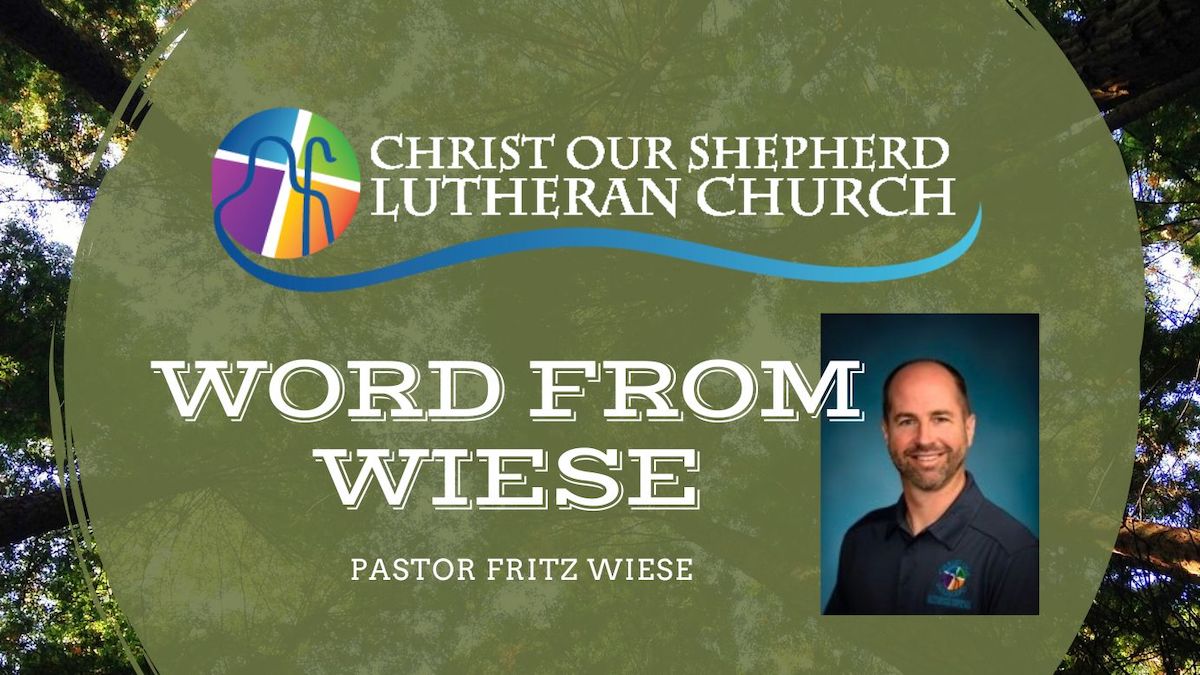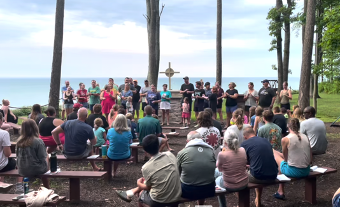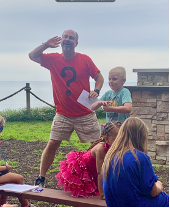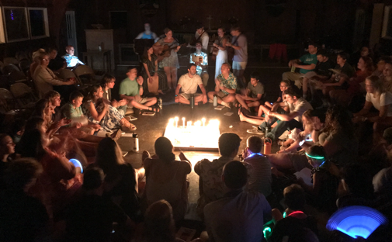Disruption
Word from Wiese
10 July 2024
What is church?
Is church a building? Sunday morning liturgy? A large group of small groups of all kinds? Justice efforts ranging from local feeding initiatives to worldwide refugee support? A source of hurt or healing, depending on the story? Jesus’ message, meal or more?
This Sunday, we bless our COS high schoolers bound for the ELCA National Youth Gathering in New Orleans. Yesterday, I returned from serving as chaplain at one of our ELCA church camps. Both youth gatherings and church camps are cited by many as their most life-giving expressions of “the church.” Both involve a holy time apart dedicated to fairly intense interaction with other Jesus followers. Merging worship, food, games, faith reflection, challenging questions and speakers, and a strong atmosphere calling participants to recognize themselves as God’s children designed for celebration and service, youth gatherings and church camps are two fantastic expressions of “the church” through which the Holy Spirit calls, equips, and inspires God’s for current growth and future leadership. More than half of all pastors serving today, for instance, cite a profound experience at an ELCA gathering or camp as a catalyst for their pathway into ordained ministry.
In a few Sundays, our youth will share highlights from the New Orleans Youth Gathering. But today, let me give you a quick window from Camp Luther.
- It’s a week, for families of all ages and forms, of spirituality with evening worship (my primary role) overlooking the shimmering lake and soaring eagles, morning family devotions, kids discovery and adult group study, singing tree, and faith conversations on swings overlooking Lake Erie.
- It’s a week of walking in flip-flops with your toes rubbing grass instead of driving on endless pavement.Sunsets, breezes, birds of all types chirping in wildflowers, and temperature swings. One experiences more deeply the rhythm of twinkling stars and rising sun.
- Families sitting at large ding hall tables with new families each day, interacting as whole families instead of sliced identities of parents, professionals, or students.
- It’s a place apart—playing with the Greek word for church, ecclesia, or “called out”–where you’re somehow freer and more unified because it’s not about your political party, car your drive, bank account, or clothes you wear.Everyone stays in simple cabins, eats the same food, shares the same shower houses, and enjoys the same schedule. It’s quite a thing to be in the flow of just enjoying Jesus’ community. What amazing joy to see high school boys belting out silly songs with the preschoolers, not worried about how it might look on social media, letting the kids run free because safety abounds, or striking up a conversation with anybody else. People often testify they discover (or re-discover) who they and their family truly are (and called to be) within God’s plan in this special setting and community.
Another cool parallel of ELCA church camps and the national gathering in 2024 is that we’re following the same theme: “Created to Be . . . .” And for all five days, we pursued a special word. Free. Authentic. Brave. Disciple. Disruptive.
On the final night at Camp Luther, I asked three campers I met to share of their perspectives on how Christians are created to be . . . disruptive. At first, it’s a tough word. But the three speakers did a sensational job of explaining their take.
While my intent is to keep these WFWs brief, I can’t help but share one of the testimonies. One speaker, Mary Beth, has been invited by the U.S. Olympic Leadership Team to join them in Paris based on her new research in organizational change. A second speaker, Rich, knocked it out of the park with how unexpected disruption can create new pathways in relationships. But let me share the comments of Dave Lenz, who is a member of the ELCA Church Council and also the Commission for a Renewed Lutheran Church. (You meet some interesting folks at camp, wouldn’t you say?). So, Dave joins in the spirit of this email’s opening question “what is church?” And in the spirit of connecting what God is doing, even disruptively, in church at COS, with church at camp, with church at the churchwide level, I share Dave’s thoughts below.
From Dave Lenz
“Just then a lawyer stood up to test Jesus.”
So begins Luke’s description of Jesus’s telling of the parable of the Good Samaritan—significant to me due to its connection to a food pantry I served at that was an inflection point in my life of faith. Rather than give that whole backstory, since Fritz told me I only have about 4 minutes, I’ll focus instead on what I appreciate about the story now, after 18 years as a private practice attorney and as someone who has held various lay leadership positions in our church.
I recognize there is generally no significant similarity between what I do as a profession and what a “lawyer” of Jesus’ day did. However, I do see a common thread in the thinking. The lawyer of the story understands the importance of the commandment to love the neighbor. He asks “Who is my neighbor?” It’s a lawyer interpreting a rule to understand what the required minimum is. This is the way we are trained to think. If I have to love my neighbor, tell me who my neighbors are—and, by implication, who they aren’t—and I’ll give you what you require. In response, Jesus then tells a socially disruptive story that effectively says “You’re asking the wrong question.” Jesus instead asks who acted as a neighbor. Neighbor isn’t a defined class out there. It’s how you internally choose to treat the other.
Words and definitions have power. As we discussed in our conversations about being Created to Be Free, sometimes words and rules provide healthy boundaries, but other times they seem arbitrary, irrelevant, or even hurtful and exclusive to others.
As a denomination, we view our church in three expressions—over 9,000 congregations, 65 regional bodies known as synods, and the national churchwide organization. Each of these is governed by written words and definitions of how they relate. I’ve had a chance to serve in leadership in all three expressions—a congregation Council president, Secretary of the Northeastern Ohio Synod, and am nearing completion of my 5th of 6 years in a term on the ELCA’s national Church Council. I’ve seen both how these structures work well and where it feels there may be a need for the Spirit to disrupt church business-as-usual to break out of old habits and re-focus on the proclamation of the gospel to those outside our communities.
We see challenges and disruptions at the churchwide level from the ways in which retirements of pastors far exceed the numbers of seminary graduates joining the ranks; from the shifts in population and religious affiliation in our culture that have made our synods unbalanced in resources but still expected to serve the same functions for all; from our persistence as the whitest denomination in the United States, lacking the cultural diversity of God’s creation; from the fact that a model of individual congregations with their own building and full time pastor is increasingly unsustainable in many places in our church; and from growth and energy for the gospel in places that are not traditional congregations and accordingly struggle for financial resources.
In the face of these disruptions, the ELCA’s 2022 Churchwide Assembly approved a resolution calling for the creation of a Commission for a Renewed Lutheran Church. It is charged with examining our denomination’s statements of purpose and principles of organization, also while being mindful of our shared commitment to dismantle racism, and ultimately presenting its recommendations to the 2025 Churchwide Assembly, including specifically whether there should be a call for a reconstituting convention of the ELCA. Talk about disruption in our church! I am one of two members of the Church Council appointed to this 35-person commission, and we are getting into the heart of this work as we have less than 13 months until the recommendations are presented in Phoenix in late July 2025. (A lovely time to be in Phoenix, I’m told!)
We are wrestling with many of these challenges. We are seeking ways to get to the core purpose of the church—which really centers on Word and Sacrament ministry despite all the other wonderful works the church does—and how to provide adequate resources for that work. We are looking to see if there are other ways to define what it means to be church and more fully integrate into our church’s systems places like the campus ministry at The Ohio State University that was transformative in my faith life or this camp, which is such a longstanding place of faithful community, neither of which is formally recognized as an “expression” of our church nor tremendously well-resourced by the church–as we learned from Stewart Shipman and his team last night.
For my part, I bring insights from my experience in various places in our church ecosystem, but I view my calling on the Commission as more of a technician. My work as an attorney in nonprofit organization compliance and my many years on Synod and churchwide constitution committees will help me as we look to turn new and disruptive concepts into words and rules to govern our shared work for the sake of the gospel. As each of us is created to be free, the Commission seeks to identify a framework that provides appropriate guardrails and accountability to each other while providing enough freedom to let the disciples of Christ gathered and called in their own local community be brave in their proclamation of the gospel.
The Churchwide work is important. The words we write about how we are organized define relationships with our neighbor and carry legal authority and financial resourcing. But, people only come to be in faithful community through intensely local and personal connections. I pray that we each are willing to disrupt the narrative that the church is in decline by taking the spirit of discipleship and community we lived in this week back with us from this space to live out our callings individually and collectively in those places we call home.
Questions for Reflection:
- What is a “place apart” for you?Where you have felt inspired as one of God’s beloved family members who gets to enjoy the family?
- What do you make of the world “disruptive?”How can disruption be hard? Or refreshing and positive?
- How do you think of the church?Where does God call people out for special purposes in Jesus’ name?
In Christ’s hope,
Pastor Fritz
Let us pray:
Thanks for your Holy Spirit calling us to gather in local congregations. And thanks for also calling us into the adventure of youth gatherings, church camps, and mission experiences far and wide. Help us be creative when disruption comes our way. Bless us individually and collectively to be the children, servants and story-tellers you create us to be, for your glory and the benefit of your human family. In Jesus’ name, Amen.






